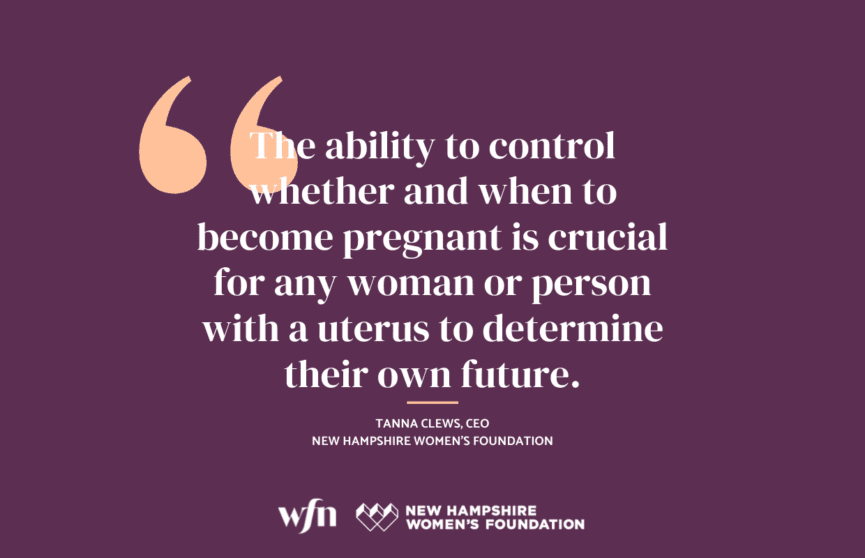Our collective liberation is inextricably intertwined with the freedom to control when, and if, we become a parent. Any gender with the ability to become pregnant must have access to the full range of reproductive health care that respects their dignity, privacy, and freedom.
Feminist funds around the world support reproductive justice because of its impact on progress toward gender equity. WFN member Tanna Clews, CEO of the New Hampshire Women’s Foundation, discussed the impact of the most recent U.S. law enacted in Texas that effectively eliminated legal abortion care in that state.
Below, find the full interview with Tanna about her work supporting the fight for reproductive justice in New Hampshire and in collaborations across the country.
Tanna, it’s great to connect with you. What is SB8, and what does it mean for the women of Texas?
SB8, now law in Texas, is a so-called “heartbeat bill” that makes it illegal for a pregnant person to have an abortion if a fetal heartbeat is detected, or if requisite tests to check for a heartbeat have not been performed — essentially ending abortion options at about 6 weeks, or before many people with a uterus even know they are pregnant. Until now, laws like these have always been struck down by the courts as unconstitutional — however this law was designed with a slightly different approach, empowering private citizens (instead of law enforcement or lawmakers) to enforce the law by suing abortion providers, or anyone who “aids and abets” a person seeking an abortion after 6 weeks. If they win, each “citizen bounty hunter” (who may reside anywhere across the country and do not need a tie to the pregnant person) can be awarded for $10,000. The goal of this bill is to overwhelm abortion providers and funders with costly court fees, and we have already seen women and pregnant people turned away from seeking abortion care.
What lasting impacts does SB8 have on reproductive justice? How does it impact people around the country?
This sets a precedent with the Supreme Court declining to strike it down — anti-abortion state legislatures across the country are now likely to copy the bill and try to pass versions of it in their states. This is also a signal from SCOTUS of how they may rule on several cases on the docket that challenge Roe v. Wade itself — and 17 states have “trigger laws” that will make abortions illegal when and if Roe is officially struck down. Another way this can impact folks beyond the borders of Texas is that anyone — from any state — may be sued for aiding or abetting abortions for people seeking them in Texas. Something as simple as donating to an abortion fund might make a person or organization a target of these frivolous lawsuits.
Why are reproductive rights so crucial?
The ability to control your own body and whether and when to become pregnant is crucial for women (or anyone with a uterus) to determine their own future.
What is New Hampshire WF doing in their community to fight for reproductive justice?
The New Hampshire Women’s Foundation is an explicitly pro-choice organization. We are meeting regularly with our reproductive justice coalition partners to make sure we understand the full legal implications of SB8 and how it might affect us in the short term, and how we fight against a copycat bill in NH. Sadly, our own NH legislature passed a cruel abortion ban this year, too — outlawing abortions after 24 weeks with no exceptions for rape, incest or fatal fetal anomalies, and requiring invasive ultrasounds before abortions at any stage of pregnancy. We have shown up at hearings, filed testimony and encouraged our network to contact their legislators and Governor in opposition of these bills. Now that the ban is law, we are not letting up — holding legislators accountable for their votes and keeping the pressure up is key. We are also implementing language on our eligibility checklist for those seeking grant funds to ensure that we are only funding organizations who support a full range of reproductive health options.
What is Roe v. Wade and how does it impact the marginalized genders of your community?
Roe v. Wade is the affirmation of a constitutional right to an abortion for anyone who can become pregnant. Generations of women have fought for this right, and to see it come under such blatant and dangerous attacks is horrifying. I have heard the stories of back alley abortions, and the leaders at our predecessor organizations never would have thought we would be gearing up to again fight for abortion as a right in 2021. These most recent attacks have me more committed than ever to the fight for reproductive freedoms, in New Hampshire and across the country.
What does reproductive justice mean to you?
Reproductive justice was a term created by Black feminist reproductive rights and access advocates to honor particularly the Black women organizers mostly in the South who laid the groundwork for our more intersectional and inclusive movement for reproductive freedoms. In our work fighting for reproductive rights for all we recognize that women of color, low income women, and marginalized genders including trans men, are all affected disproportionately by abortion access. Wealthy people who need abortions will always be able to get them — abortion bans make abortions less safe and accessible to those who need them most.
